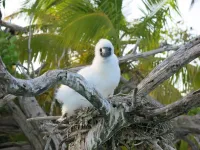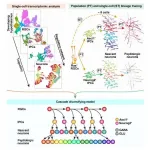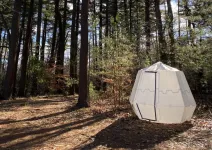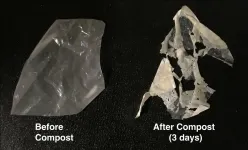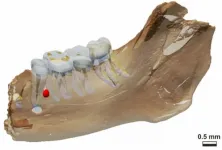INFORMATION:
The paper is entitled: "Overshooting tipping point thresholds in a changing climate."
Climate 'tipping points' need not be the end of the world
2021-04-21
(Press-News.org) The disastrous consequences of climate "tipping points" could be averted if global warming was reversed quickly enough, new research suggests.
Once triggered, tipping points may lead to abrupt changes such as the dieback of the Amazon rainforest or melting of major ice sheets.
Until now, crossing these thresholds has been assumed to be a point of no return, but the new study - published in the journal Nature - concludes that thresholds could be "temporarily exceeded" without prompting permanent shifts.
The research team, from the University of Exeter and the UK Centre for Ecology and Hydrology (UKCEH), say the time available to act would depend on the level of global warming and the timescale involved in each tipping point.
"The more extreme the warming, the less time we would have to prevent tipping points," said lead author Dr Paul Ritchie, of Exeter's Global Systems Institute and the Department of Mathematics.
"This is especially true for fast-onset tipping points like Amazon forest dieback and disruption to monsoons, where irreversible change could take place in a matter of decades.
"Slow-onset tipping points take place over a timescale of many centuries and - depending on the level of warming - this would give us more time to act."
Joe Clarke, also of the University of Exeter, said: "Fortunately, the tipping points that are believed to be closest are slow-onset tipping points. This may give us a lifeline to avoid dangerous climate change."
Concerns about tipping points like Greenland ice sheet melt are one of the reasons for the Paris Agreement targets to keep global warming below 1.5°C.
"However, current rates of warming make it almost inevitable that we will exceed that level," said Professor Peter Cox.
Dr Ritchie added: "It is widely assumed that this means we are now committed to suffering these tipping events.
"We show that this conventional wisdom may be flawed, especially for slow-onset tipping elements such as a collapse of the Atlantic Meridional Overturning Circulation or the melting of ice sheets."
The "time to act" was calculated as the time taken to reverse warming and stabilise at 1.5°C above pre-industrial levels.
"Ideally, we will not cross tipping point thresholds, but this gives hope we may be able to pull back from danger if needed," said Dr Chris Huntingford of UKCEH.
ELSE PRESS RELEASES FROM THIS DATE:
New evidence shows important seabird nutrients reach coral reefs after rat eradication
2021-04-21
Scientists have provided the first evidence to show that eradicating rats from tropical islands effects not just the biodiversity on the islands, but also the fragile coral seas that surround them.
The new study led by scientists at Lancaster University and published in the journal Current Biology shows that critical cycles of seabird nutrients flowing to coral reefs are re-established within relatively short time periods after rats are removed - even around islands that have been infested for hundreds of years.
The findings offer encouragement that rat eradication can benefit coral ...
Examining association between wildfire air pollution, clinic visits for Eczema, itch
2021-04-21
What The Study Did: Researchers looked at whether short-term exposure to air pollution from a 2018 California wildfire was associated with changes in the number of clinic visits for eczema or itch and medications prescribed for eczema.
Authors: Maria L. Wei, M.D., Ph.D., of the University of California, San Francisco, is the corresponding author.
To access the embargoed study: Visit our For The Media website at this link https://media.jamanetwork.com/
(doi:10.1001/jamadermatol.2021.0179)
Editor's Note: The article includes conflicts of interest and funding/support disclosures. Please see the article for additional information, including other authors, author contributions and affiliations, conflict of interest and financial disclosures, ...
First of its kind study links wildfire smoke to skin disease
2021-04-21
Wildfire smoke can trigger a host of respiratory and cardiovascular symptoms, ranging from runny nose and cough to a potentially life-threatening heart attack or stroke. A new study suggests that the dangers posed by wildfire smoke may also extend to the largest organ in the human body, and our first line of defense against outside threat: the skin.
During the two weeks in November 2018 when wildfire smoke from the Camp Fire choked the San Francisco Bay Area, health clinics in San Francisco saw an uptick in the number of patients visiting with concerns of eczema, also known as atopic dermatitis, and general itch, compared to the same time of the year ...
Scientists reveal origin of neuronal diversity in hypothalamus
2021-04-21
A mechanistic understanding of brain development requires a systematic survey of neural progenitor cell types, their lineage specification and maturation of postmitotic neurons. Cumulative evidences based on single-cell transcriptomic analysis have revealed the heterogeneity of cortical neural progenitors, their temporal patterning and the developmental trajectories of excitatory and inhibitory neurons in the developing neocortex. Nevertheless, the developmental hierarchy of the hypothalamus, which contains an astounding diversity of neurons that regulate endocrine, autonomic and behavioral functions, has not been well understood.
Recently, however, Prof. WU Qingfeng's ...
Review: Changing views on atherosclerosis
2021-04-21
WHO Peter Libby, MD, cardiovascular medicine specialist at Brigham and Women's Hospital and the Mallinckrodt Professor of Medicine at Harvard Medical School; author of a new review paper published in Nature.
WHAT Atherosclerosis -- hardening of the arteries -- is now involved in the majority of deaths worldwide, and advances in our understanding of the biology of the disease are changing traditional views and opening up new avenues for treatment.
The picture of who may be at risk for a heart attack has evolved considerably in recent decades. At one time, a heart attack might have conjured up the image of a middle-aged white man with high cholesterol and high blood pressure who smoked cigarettes. Today, traditional concepts of what contributes to risk have changed. These ...
Bistable pop-up structures inspired by origami
2021-04-21
In 2016, an inflatable arch wreaked havoc at the Tour de France bicycle race when it deflated and collapsed on a cyclist, throwing him from his bike and delaying the race while officials scrambled to clear the debris from the road. Officials blamed a passing spectator's wayward belt buckle for the arch's collapse, but the real culprit was physics.
Today's inflatable structures, used for everything from field hospitals to sporting complexes, are monostable, meaning they need a constant input of pressure in order to maintain their inflated state. Lose that pressure and the structure ...
In calculating the social cost of methane, equity matters
2021-04-21
What is the cost of 1 ton of a greenhouse gas? When a climate-warming gas such as carbon dioxide or methane is emitted into the atmosphere, its impacts may be felt years and even decades into the future - in the form of rising sea levels, changes in agricultural productivity, or more extreme weather events, such as droughts, floods, and heat waves. Those impacts are quantified in a metric called the "social cost of carbon," considered a vital tool for making sound and efficient climate policies.
Now a new study by a team including researchers from Lawrence Berkeley National Laboratory (Berkeley Lab) ...
To design truly compostable plastic, scientists take cues from nature
2021-04-21
Despite our efforts to sort and recycle, less than 9% of plastic gets recycled in the U.S., and most ends up in landfill or the environment.
Biodegradable plastic bags and containers could help, but if they're not properly sorted, they can contaminate otherwise recyclable #1 and #2 plastics. What's worse, most biodegradable plastics take months to break down, and when they finally do, they form microplastics - tiny bits of plastic that can end up in our oceans, fish, and even our bodies.
Now, as reported in the journal Nature, scientists at the Department ...
Recolonization of Europe after the last ice age started earlier than previously thought
2021-04-21
A study that appeared today on Current Biology sheds new light on the continental migrations which shaped the genetic background of all present Europeans. The research generates new ancient DNA evidence and direct dating from a fragmentary fossil mandible belonging to an individual who lived ~17,000 years ago in northeastern Italy (Riparo Tagliente, Verona). The results backdate by about 3,000 years the diffusion in Southern Europe of a genetic component linked to Eastern Europe/Western Asia previously believed to have spread westwards during later major warming shifts.
"By looking into the past of this particular individual, ...
Astronomers release new all-sky map of the Milky Way's outer reaches
2021-04-21
Astronomers using data from NASA and the ESA (European Space Agency) telescopes have released a new all-sky map of the outermost region of our galaxy. Known as the galactic halo, this area lies outside the swirling spiral arms that form the Milky Way's recognizable central disk and is sparsely populated with stars. Though the halo may appear mostly empty, it is also predicted to contain a massive reservoir of dark matter, a mysterious and invisible substance thought to make up the bulk of all the mass in the universe.
The data for the new map comes from ESA's Gaia mission and NASA's Near Earth Object Wide Field Infrared Survey Explorer, or NEOWISE, which operated from 2009 to 2013 under the moniker WISE. The study, led by astronomers at the Center for ...
